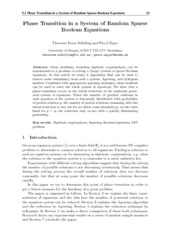| dc.contributor.author | Schilling, Thorsten Ernst | eng |
| dc.contributor.author | Zajac, Pavol | eng |
| dc.date.accessioned | 2012-11-19T11:53:46Z | |
| dc.date.available | 2012-11-19T11:53:46Z | |
| dc.date.issued | 2012 | eng |
| dc.Published | Tatra Mountains Mathematical Publications 45: 93–105 | eng |
| dc.identifier.uri | https://hdl.handle.net/1956/6193 | |
| dc.description.abstract | Many problems, including algebraic cryptanalysis, can be transformed to a problem of solving a (large) system of sparse Boolean equations. In this article we study 2 algorithms that can be used to remove some redundancy from such a system: Agreeing, and Syllogism method. Combined with appropriate guessing strategies, these methods can be used to solve the whole system of equations. We show that a phase transition occurs in the initial reduction of the randomly generated system of equations. When the number of (partial) solutions in each equation of the system is binomially distributed with probability of partial solution p, the number of partial solutions remaining after the initial reduction is very low for p’s below some threshold pt, on the other hand for p > pt the reduction only occurs with a quickly diminishing probability. | en_US |
| dc.language.iso | eng | eng |
| dc.publisher | Versita Open | en_US |
| dc.rights | Attribution-NonCommercial-NoDerivs CC BY-NC-ND | eng |
| dc.rights.uri | http://creativecommons.org/licenses/by-nc-nd/3.0/ | eng |
| dc.subject | Algebraic cryptanalysis | eng |
| dc.subject | Agreeing | eng |
| dc.subject | Boolean equations | eng |
| dc.subject | SAT problem | eng |
| dc.title | Phase Transition in a System of Random Sparse Boolean Equations | en_US |
| dc.type | Chapter | |
| dc.type | Peer reviewed | |
| dc.description.version | acceptedVersion | en_US |
| dc.rights.holder | Creative Commons Public License. | en_US |
| dc.identifier.doi | https://doi.org/10.2478/v10127-010-0008-7 | |

